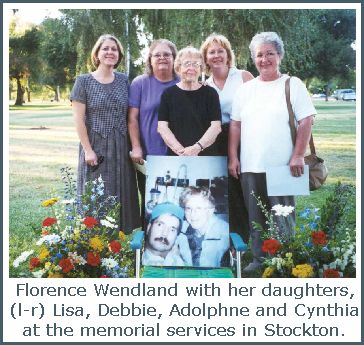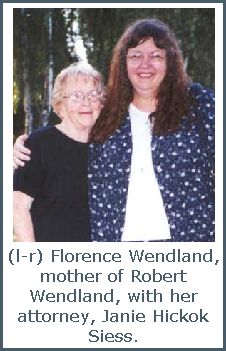July 28, 2001 was a warm summer evening in
Stockton, California. About sixty friends and
 family members
assembled in a public park and sat on folding chairs. Nearby,
young children were playing catch and riding bikes. The people came
to honor the memory of Robert Wendland who died on July 17, 2001.
Robert's 78 year0-old mother Florence and four of his siblings sat in the
front row. Noticeably, but not unexpectedly absent, were Wendland's
wife Rose and their three children.
family members
assembled in a public park and sat on folding chairs. Nearby,
young children were playing catch and riding bikes. The people came
to honor the memory of Robert Wendland who died on July 17, 2001.
Robert's 78 year0-old mother Florence and four of his siblings sat in the
front row. Noticeably, but not unexpectedly absent, were Wendland's
wife Rose and their three children.
Eight
years earlier Robert Wendland had been in a severe motor vehicle accident.
After 16 months he pulled out of a coma, but the accident left him with
extensive brain damage. He could do limited activities such as operate
a motorized wheel chair and write the letter "R" as well as some other
letters.
In 1995, his wife Rose sought
authorization from a California court to have his feeding tube removed, an
act that would have brought about his death by dehydration and starvation.
When Wendland's mother and sisters learned of this, via an anonymous
telephone call, they obtained an injunction, preventing his wife from
carrying out her plan. Since then Wendland has been the focus of an
intense legal battle, which pitted his mother Florence and other family
members against his wife. The case finally was appealed to the Supreme
Court of California. On May 309, 2001,
 Janie Hickok Siess, Wendland's
attorney of six years, presented her oral argument to the state's highest
court.
Janie Hickok Siess, Wendland's
attorney of six years, presented her oral argument to the state's highest
court.
In light of Wendland's death the court
could have sidestepped the issue and ruled that the case was moot.
However, they courageously went ahead with their decision because of the
overriding significance of the issues the case presented. On August
10, 2001, just 13 days after the quiet memorial service in the park, the
Supreme Court of California formally announced its decision. In a 50
page, 6-0 (unanimous) decision authored by Justice Kathryn Werdeger, the
High Court ruled that a California conservator is not authorized
to withdraw food and fluids from a conscious, cognitive conservatee such as
Robert Wendland unless he shows by clear and convincing evidence that to do
so would either be consistent with the conservatee's prior expressed wishes
or in his best interest. Justice Werdeger noted that, "the importance
of the ultimate decision and the risk of error are manifest. So too
should be the degree of confidence required in the necessary findings of
fact." Following the lead of the Michigan and Wisconsin High Courts
which, in 1995 and 1997, respectively, refused to start down this "slippery
slope", Justice Werdeger observed that "[t]he decision to treat is
reversible. The decision to withdraw treatment is not."